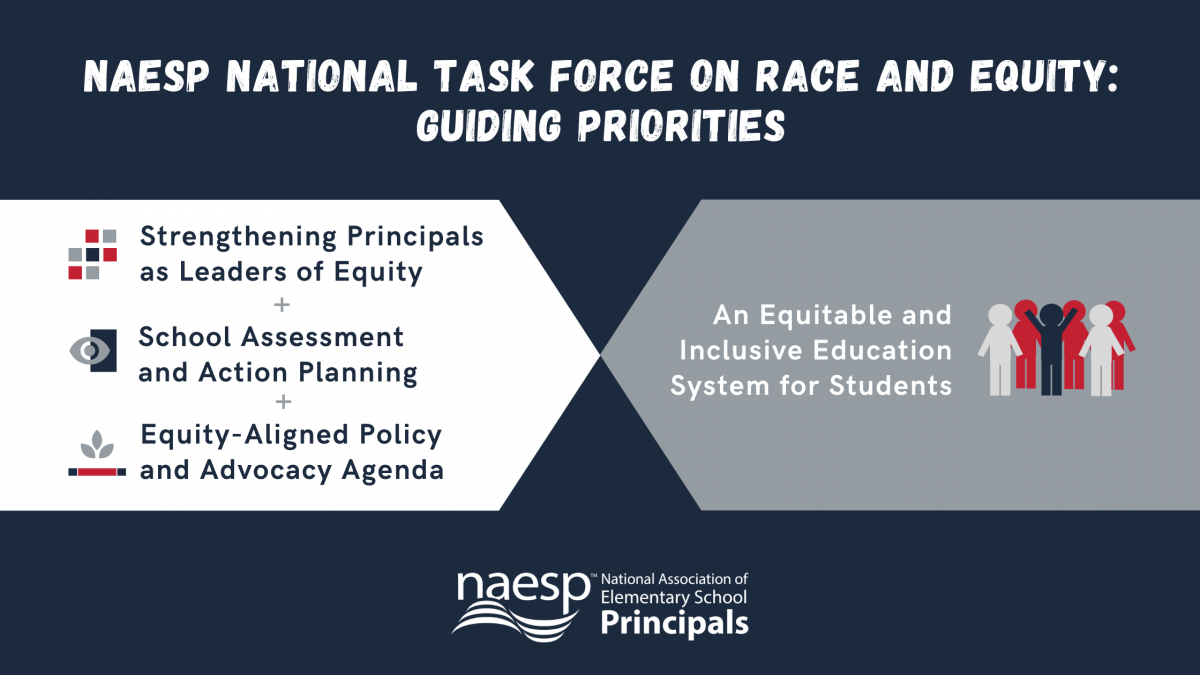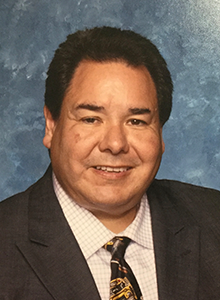National Task Force on Race and Equity
 Because it values diversity in our culture and prioritizes achieving education equity, the National Association of Elementary School Principals (NAESP) formed its National Task Force on Race and Equity. The task force will advise NAESP on issues related to racial equity in school communities, reveal schools’ common challenges and solutions, and support a peer-to-peer network of support for school leaders.
Because it values diversity in our culture and prioritizes achieving education equity, the National Association of Elementary School Principals (NAESP) formed its National Task Force on Race and Equity. The task force will advise NAESP on issues related to racial equity in school communities, reveal schools’ common challenges and solutions, and support a peer-to-peer network of support for school leaders.
The task force will focus on collecting information related to racial equity in schools, elevating relevant research, and determining how best NAESP can provide support to principals around these issues. In conjunction and collaboration with NAESP staff, the task force will host events for school leaders to share valuable best practices and produce recommendation to advance racial equity in the principal profession and in public schools.
Principals—who research says are among the most trusted professionals—are tasked with advancing culturally responsive teaching and learning, which includes not only welcoming diversity in the classroom but also teaching students how to navigate an increasingly racially, ethnically, and socioeconomically diverse society.
NAESP firmly believes that principals, as a beacon of hope and inspiration for many community members, can play a central role in leading efforts to improve racial inequities. It is our sincere hope that this task force can elevate the dialogue around these issues and support principals in this work.
Task Force
The task force members were selected based on their outstanding leadership to NAESP, in addition to their state, regional, and national colleagues.
President

Kimbrelle Barbosa Lewis
Cordova Elementary School
Cordova, Tennessee
At Large

Thomas Payton
Roanoke Avenue Elementary School
Riverhead, New York
At Large

Dr. Liza Caraballo-Suarez
Magnet School of Architecture,
Engineering & Design — P.S. 120
Brooklyn, New York
Guiding Priorities
1. Strengthening Principals as Leaders of Equity
Professional learning for principals that positions them as equity leaders and enhances key skill sets such as:
- Personal reflection on race and implicit bias: Explore implicit biases and how they impact safe and culturally responsive learning communities.
- Listening skills and courageous conversations: Develop critical facilitation skills to address race and equity with students, staff, and school community.
2. School Assessment and Action Planning
Curated tools and customized resources for school leaders that will include:
- Schoolwide equity audit and screener tool: Review building and district-level student achievement data, staff hiring and retention practices, discipline policies, and digital access.
- Curriculum and access review: Assess text selection, instruction, assignments, standards, and assessments with an eye toward equity. Also review gifted and special education programs.
- Schoolwide equity training: Vetted training resources on various aspects of culturally responsive leadership.
3. Equity-Aligned Policy and Advocacy Agenda
- Data collection: Gain insights about principals’ experiences and professional learning needs from unconscious bias survey.
- Policy review: Use insights from principal unconscious bias survey to inform advocacy agenda, including identification of federal funding opportunities to support principals in their race and equity work. Examples might include targeted principal professional funding and grant programs to support principals to lead on equity in their schools.
Resources and supports for these guiding priorities will be announced in the coming months. But immediate next steps include:
- Implicit Bias: NAESP has entered into a custom research services agreement with Project Implicit to develop and host an online research study. This study will consist of an Implicit Association Test/web study for NAESP members focused on identifying biases related to race. This customized project should be finalized and ready for use by the start of November.
- Equity Audit: NAESP is in discussions with various organizations regarding the potential collaboration for an equity audit/screener tool for school leaders.
Implicit Bias
Unconscious and implicit racial biases can impact a school leader’s ability to lead an equitable learning environment for all students. As part of its work with the task force and the NAESP Center for Diversity Leadership, NAESP is hosting a two-part, virtual training on implicit bias.
We offer these training sessions—developed in partnership with Project Implicit—in response to the feedback NAESP members shared about their professional learning needs in the recent NAESP Implicit Association Assessment, conducted Nov. 12 to Dec. 9, 2020.
Dr. Sylvia Perry, assistant professor of psychology at Northwestern University, will facilitate the sessions. It is recommend that you complete the implicit bias assessment (Race IAT) prior to the training.*
Session I: A Primer on Implicit Racial Bias
Thursday, Feb. 11, 11 a.m. – 12:30 p.m. ET
Objectives:
- To raise participants' awareness of their own biases;
- To educate participants on how researchers understand and measure biases; and
- To provide actionable steps for individuals and organizations to mitigate the influence of biases on thoughts and behaviors.
Register
Session II: Mitigating Implicit Racial Bias in Schools
Friday, March 5, 1:30 – 3:30 p.m. ET
Objectives:
- To expand on the foundational knowledge presented in Session I;
- To explore the actions and types of decision-making that biases, attitudes, or stereotypes may affect within the school building; and
To brainstorm how educational leaders can implement and measure strategies for mitigating the influence of biases on thoughts and behaviors
Register
*There is no cost for registration although space is limited. Register for each session separately.








